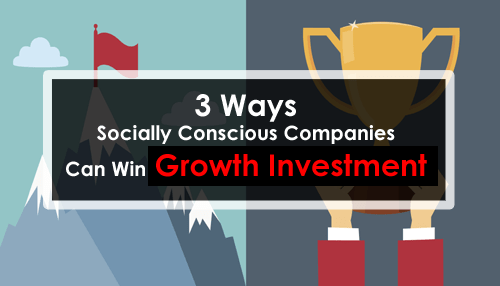Finding startup funding — especially for socially conscious companies — is difficult. Year-over-year growth Investment is at its highest level in the past two decades, but it’s still below the historic norm.
Everybody knows failure rates among startups are high, and this risk profile leads to decreased investor tolerance across the board. At the startup level, investors still see a zero-sum game. The company will either succeed or fail. And an investor will show reluctance until he’s fairly certain the business is a winner.
This goes double for the growth phase when companies are ready to move out of startup status and go bigger in the market.
Socially conscious companies in this phase have even steeper funding challenges than more traditional companies because investors are even less sure that these organizations will yield significant returns. Old-school venture capitalists tend to be wary of values-based investing, and they’re not alone. Many people are still unfamiliar with socially conscious companies, so they’re less likely to take chances on them.
Let’s look at the challenges posed by some of the standard investment structures:
1. Venture capitalists:
VCs are great allies for young and growing companies because they bring money and vast investment networks to the table. Because of the risk, they’re taking on, however, they often want a significant amount of equity and a strong voice in the company.
That can prove a major source of friction as socially conscious companies prepare to grow. The founders may want to ramp up emphasis on the social good aspect of the business, but VCs invest to make money. A VC may be skeptical of socially conscious companies going into the growth phase because it’s not clear whether the organization can turn a profit outside of its startup period.
2. Crowdfunding:
Individuals typically back crowdfunding campaigns in exchange for access to the product. Depending on the socially conscious company’s business model, the business may risk alienating people with its particular cause. It may also be more difficult to strike a balance between delivering on products and on social promises as the company develops.
A startup that relies on reward-based crowdfunding must also beware of backlash if it sells the organization to a larger corporation. The stakes are especially high for socially conscious businesses because people have a stake in its values and may be particularly critical of a corporate deal.
Securities crowdfunding is also a double-edged sword because companies can use social media to build awareness, which under recently passed crowdfunding securities can help with the aggregation of capital. But if the enterprise fails, it does so heavily, quickly, and publicly.
3. Angel networks:
These investors offer a faster turnaround on delivering funds, but they’re much more averse to risk than VCs or individual crowdfunders. Socially conscious businesses need to prove their worth, and even then, angels may pass on investing. If there’s not a well-planned route to profitability, angels aren’t going to risk their money — no matter how worthy the social cause.
While these obstacles to attracting growth investment exist, they’re not impossible to overcome.
Beating the odds
Investors are often averse to working with socially conscious companies, so those businesses need to win their confidence. Prepare your pitch around the following three pillars, and you will likely find that investors look at you with greater interest:
- Establish a clear strategy. Create a forecast for where your brand and your market are headed during the next 12, 24, and even 36 months. Wayne Gretzky once said: “A good hockey player plays where the puck is. A great hockey player plays where the puck is going to be.” The same holds in business. You need a data-backed, executable vision for what your business’s growth will look like.
- Demonstrate scalability. Presenting your growth plan is important, but investors still want to see how it’s going to happen. Explain how you’re going to manage increased manufacturing and marketing of your product or service. Scaling a company is all about execution, and investors want to ensure that you have a hold on those details.
- Stay agile. Assure investors that you’re prepared to iterate on your long-term road map. The beauty of entrepreneurship is that you have the freedom to pivot based on new market conditions and customer demand. Incorporate consumer feedback into your ongoing decision process, and investors will be more likely to bite.
A sea change is coming for socially conscious investing, and it’s largely driven by Millennials. This demographic prizes ethical investments and factors social impact into everything from purchasing choices to career decisions. While traditional investors still tend to be skittish around all but the most promising social organizations, we will see increased interest in the next several years.
Until then, socially conscious companies should keep their eyes on the bottom line (as well as their broader impacts). Having a balanced idea of where the business is headed and how it benefits both stakeholders and society at large is the kind of thinking investors want to see.


